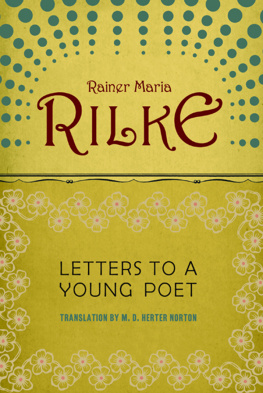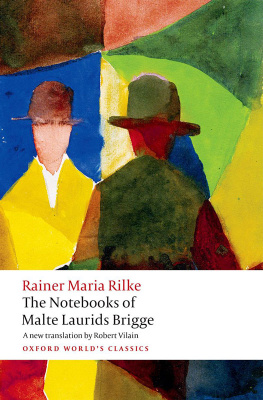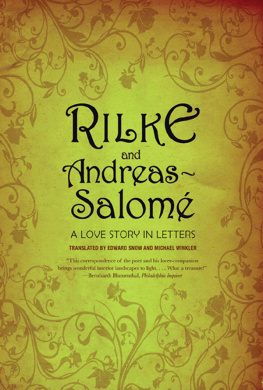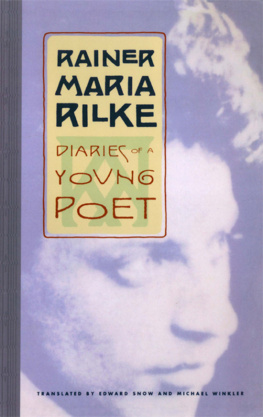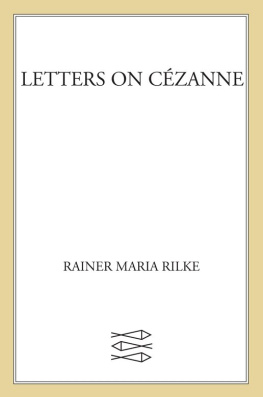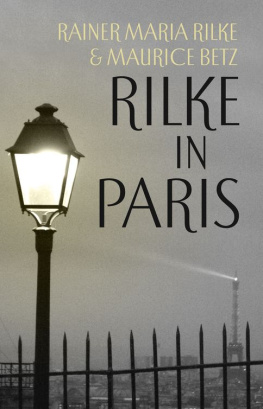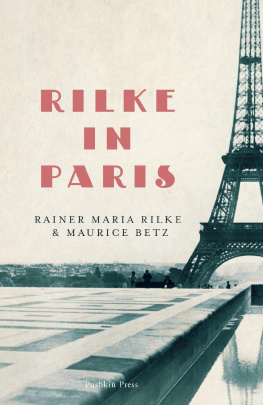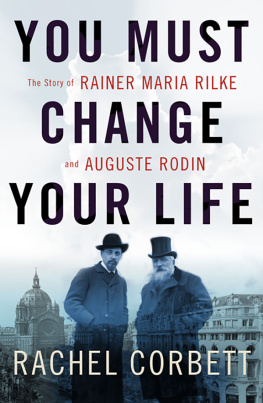Rainer Maria Rilke - Letters to a Young Poet
Here you can read online Rainer Maria Rilke - Letters to a Young Poet full text of the book (entire story) in english for free. Download pdf and epub, get meaning, cover and reviews about this ebook. year: 2014, publisher: Norton, genre: Romance novel. Description of the work, (preface) as well as reviews are available. Best literature library LitArk.com created for fans of good reading and offers a wide selection of genres:
Romance novel
Science fiction
Adventure
Detective
Science
History
Home and family
Prose
Art
Politics
Computer
Non-fiction
Religion
Business
Children
Humor
Choose a favorite category and find really read worthwhile books. Enjoy immersion in the world of imagination, feel the emotions of the characters or learn something new for yourself, make an fascinating discovery.
- Book:Letters to a Young Poet
- Author:
- Publisher:Norton
- Genre:
- Year:2014
- Rating:4 / 5
- Favourites:Add to favourites
- Your mark:
- 80
- 1
- 2
- 3
- 4
- 5
Letters to a Young Poet: summary, description and annotation
We offer to read an annotation, description, summary or preface (depends on what the author of the book "Letters to a Young Poet" wrote himself). If you haven't found the necessary information about the book — write in the comments, we will try to find it.
Letters to a Young Poet — read online for free the complete book (whole text) full work
Below is the text of the book, divided by pages. System saving the place of the last page read, allows you to conveniently read the book "Letters to a Young Poet" online for free, without having to search again every time where you left off. Put a bookmark, and you can go to the page where you finished reading at any time.
Font size:
Interval:
Bookmark:

RAINER MARIA RILKE
LETTERS TO A YOUNG POET
Translation by M. D. Herter Norton

Revised Edition
W. W. Norton & Company New York London
H OW these letters came to be written is told by their recipient in his introduction, and to this there would be nothing to add were it not for the close of the eighth letter: Do not believe that he who seeks to comfort you lives untroubled among the simple and quiet words that sometimes do you good. His life has much difficulty and sadness.... Were it otherwise he would never have been able to find those words. It is evident that a great artist, whatever the immediate conditions disturbing his own life, may be able to clarify for the benefit of another those fundamental truths the conviction of which lies too deep in his consciousness to be reached by external agitations. Though Rilke expresses himself with a wisdom and a kindness that seem to reflect the calm of self-possession, his spirit may have been speaking out of its own need rather than from the security of ends achieved, so that his words indeed reflect desire rather than fulfillment. In what sort this was the case becomes apparent on perusal of the several volumes of his correspondence. From these, for the most part, the accompanying chronicle of the years 19031908 has been prepared. It shows what Rilke was going through in his own relationship to life and work at the period in question (he turned twenty-eight in December, 1903). Perhaps such a record may in a measure explain, too, why sympathy was always so responsive an element of his nature. Certainlydespite low physical vitality that often reduced him to actual ill-health, despite lack of funds and homeless wandering in search of the right places and circumstances for his work, despite all the subjective fret and hindrance because of which some think to see in him a morbidly conditioned fantasythe legend of the weary poet is dispelled, and in the end we find him always young, always constructive, the eminently positive philosopher of these letters.
New York, October, 1934
In revising the text for the present edition the translator is indebted to Herbert Steiner for many helpful criticisms and suggestions.
Washington, D.C., February, 1954
I t was in the late autumn of 1902I was sitting under some ancient chestnuts in the park of the Military Academy in Wiener-Neustadt, reading. So deeply was I absorbed in my book, I scarcely noticed when the only civilian among our professors, the Academys learned and kindly Parson Horaek, came to join me. He took the volume from my hand, contemplated the cover, and shook his head. Poems of Rainer Maria Rilke? he asked reflectively. He then turned the pages here and there, skimmed a couple of verses, gazed thoughtfully into the distance, and finally nodded. So our pupil Ren Rilke has become a poet.
And I learned of the thin, pale boy, whom his parents had sent more than fifteen years ago to the Lower Military School at Sankt-Plten so that he might later become an officer. Horaek had been chaplain to that institution at the time, and he still remembered his former student perfectly. He described him as a quiet, serious, highly endowed boy, who liked to keep to himself, patiently endured the compulsions of boarding-school life and after his fourth year moved on with the others into the Military College, which was situated at Mhrisch-Weisskirchen. Here indeed it became apparent that his constitution could not stand the strain, for which reason his parents removed him from the school and let him continue his studies at home in Prague. How the course of his life had since shaped itself Horaek could not say.
After all this it is not hard to understand how I determined in that very hour to send my poetic attempts to Rainer Maria Rilke and to ask him for his opinion. Not yet twenty, and close on the threshold of a profession which I felt to be entirely contrary to my inclinations, I hoped to find understanding, if in any one, in the poet who had written Mir zur Feier. And without having intended to do so at all, I found myself writing a covering letter in which I unreservedly laid bare my heart as never before and never since to any second human being.
Many weeks passed before a reply came. The blue-sealed letter bore the postmark of Paris, weighed heavy in the hand, and showed on the envelope the same beautiful, clear, sure characters in which the text was set down from the first line to the last. With it began my regular correspondence with Rainer Maria Rilke which lasted until 1908 and then gradually petered out because life drove me off into those very regions from which the poets warm, tender and touching concern had sought to keep me.
But that is not important. Only the ten letters are important that follow here, important for an understanding of the world in which Rainer Maria Rilke lived and worked, and important too for many growing and evolving spirits of today and tomorrow. And where a great and unique man speaks, small men should keep silence.
Franz Xaver Kappus
Berlin, June 1929
ONE
Paris,
February 17th, 1903
My dear sir,
Your letter only reached me a few days ago. I want to thank you for its great and kind confidence. I can hardly do more. I cannot go into the nature of your verses; for all critical intention is too far from me. With nothing can one approach a work of art so little as with critical words: they always come down to more or less happy misunderstandings. Things are not all so comprehensible and expressible as one would mostly have us believe; most events are inexpressible, taking place in a realm which no word has ever entered, and more inexpressible than all else are works of art, mysterious existences, the life of which, while ours passes away, endures.
After these prefatory remarks, let me only tell you further that your verses have no individual style, although they do show quiet and hidden beginnings of something personal. I feel this most clearly in the last poem, My Soul. There something of your own wants to come through to word and melody. And in the lovely poem To Leopardi there does perhaps grow up a sort of kinship with that great solitary man. Nevertheless the poems are not yet anything on their own account, nothing independent, even the last and the one to Leopardi. Your kind letter, which accompanied them, does not fail to make clear to me various shortcomings which I felt in reading your verses without however being able specifically to name them.
You ask whether your verses are good. You ask me. You have asked others before. You send them to magazines. You compare them with other poems, and you are disturbed when certain editors reject your efforts. Now (since you have allowed me to advise you) I beg you to give up all that. You are looking outward, and that above all you should not do now. Nobody can counsel and help you, nobody. There is only one single way. Go into yourself. Search for the reason that bids you write; find out whether it is spreading out its roots in the deepest places of your heart, acknowledge to yourself whether you would have to die if it were denied you to write. This above allask yourself in the stillest hour of your night: must I write? Delve into yourself for a deep answer. And if this should be affirmative, if you may meet this earnest question with a strong and simple I must, then build your life according to this necessity; your life even into its most indifferent and slightest hour must be a sign of this urge and a testimony to it. Then draw near to Nature. Then try, like some first human being, to say what you see and experience and love and lose. Do not write love-poems; avoid at first those forms that are too facile and commonplace: they are the most difficult, for it takes a great, fully matured power to give something of your own where good and even excellent traditions come to mind in quantity. Therefore save yourself from these general themes and seek those which your own everyday life offers you; describe your sorrows and desires, passing thoughts and the belief in some sort of beautydescribe all these with loving, quiet, humble sincerity, and use, to express yourself, the things in your environment, the images from your dreams, and the objects of your memory. If your daily life seems poor, do not blame it; blame yourself, tell yourself that you are not poet enough to call forth its riches; for to the creator there is no poverty and no poor indifferent place. And even if you were in some prison the walls of which let none of the sounds of the world come to your senseswould you not then still have your childhood, that precious, kingly possession, that treasure-house of memories? Turn your attention thither. Try to raise the submerged sensations of that ample past; your personality will grow more firm, your solitude will widen and will become a dusky dwelling past which the noise of others goes by far away.And if out of this turning inward, out of this absorption into your own world
Next pageFont size:
Interval:
Bookmark:
Similar books «Letters to a Young Poet»
Look at similar books to Letters to a Young Poet. We have selected literature similar in name and meaning in the hope of providing readers with more options to find new, interesting, not yet read works.
Discussion, reviews of the book Letters to a Young Poet and just readers' own opinions. Leave your comments, write what you think about the work, its meaning or the main characters. Specify what exactly you liked and what you didn't like, and why you think so.

